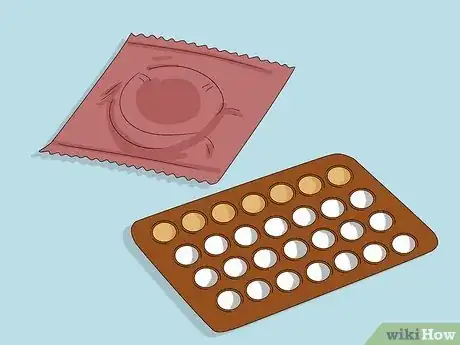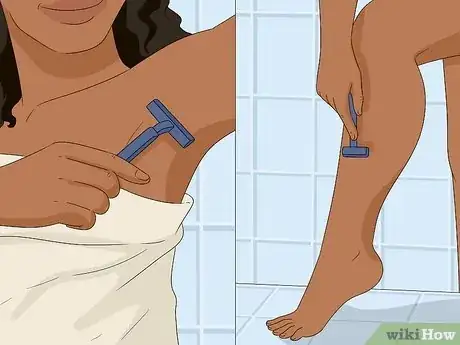This article was co-authored by Kelli Miller, LCSW, MSW and by wikiHow staff writer, Hannah Madden. Kelli Miller is a Psychotherapist based in Los Angeles, California. Kelli specializes in individual and couples therapy focusing on relationships, depression, anxiety, sexuality, communication, parenting, and more. Kelli also facilitates groups for those struggling with alcohol and drug addiction as well as anger management groups. She is the author of “Professor Kelli’s Guide to Finding a Husband” and the award-winning and best-selling book “Thriving with ADHD”. Kelli co-hosted an advice show on LA Talk Radio and is a relationship expert for The Examiner. She received her MSW (Masters of Social Work) from the University of Pennsylvania and a BA in Sociology/Health from the University of Florida.
There are 13 references cited in this article, which can be found at the bottom of the page.
This article has been viewed 32,479 times.
Having sex with someone new can be nerve wracking, but it’s also exciting, too! There are probably a lot of things running through your mind when you’re prepping to have sex, and not all of it is helpful. That’s why we’ve made a list of all the ways you can prepare for intimacy, both mentally and physically.
This article is based on an interview with our relationship expert, Kelli Miller, licensed pyschotherapist and award-winning author. Check out the full interview here.
Steps
Expert Q&A
-
QuestionHow do you know if you're ready for intimacy?
 Kelli Miller, LCSW, MSWKelli Miller is a Psychotherapist based in Los Angeles, California. Kelli specializes in individual and couples therapy focusing on relationships, depression, anxiety, sexuality, communication, parenting, and more. Kelli also facilitates groups for those struggling with alcohol and drug addiction as well as anger management groups. She is the author of “Professor Kelli’s Guide to Finding a Husband” and the award-winning and best-selling book “Thriving with ADHD”. Kelli co-hosted an advice show on LA Talk Radio and is a relationship expert for The Examiner. She received her MSW (Masters of Social Work) from the University of Pennsylvania and a BA in Sociology/Health from the University of Florida.
Kelli Miller, LCSW, MSWKelli Miller is a Psychotherapist based in Los Angeles, California. Kelli specializes in individual and couples therapy focusing on relationships, depression, anxiety, sexuality, communication, parenting, and more. Kelli also facilitates groups for those struggling with alcohol and drug addiction as well as anger management groups. She is the author of “Professor Kelli’s Guide to Finding a Husband” and the award-winning and best-selling book “Thriving with ADHD”. Kelli co-hosted an advice show on LA Talk Radio and is a relationship expert for The Examiner. She received her MSW (Masters of Social Work) from the University of Pennsylvania and a BA in Sociology/Health from the University of Florida.
Psychotherapist An emotional connection to your partner is key! You should feel like they're hearing you and understanding you. You should never feel like you have to get intimate to please your partner—it should be something you want yourself.
An emotional connection to your partner is key! You should feel like they're hearing you and understanding you. You should never feel like you have to get intimate to please your partner—it should be something you want yourself.
References
- ↑ Kelli Miller, LCSW, MSW. Psychotherapist. Expert Interview. 11 June 2020.
- ↑ https://www.plannedparenthood.org/learn/teens/sex/all-about-sex/am-i-ready-sex
- ↑ https://www.mayoclinic.org/healthy-lifestyle/sexual-health/in-depth/womens-sexual-health/art-20047771
- ↑ Kelli Miller, LCSW, MSW. Psychotherapist. Expert Interview. 11 June 2020.
- ↑ https://www.nhs.uk/live-well/sexual-health/are-you-ready-for-sex/
- ↑ Josh Spurlock, MA, LPC, CST. Licensed Professional Counselor. Expert Interview. 13 January 2022.
- ↑ https://www.cdc.gov/std/life-stages-populations/stdfact-teens.htm
- ↑ https://kidshealth.org/en/teens/shave-query.html
- ↑ https://www.betterhealth.vic.gov.au/health/conditionsandtreatments/personal-hygiene
- ↑ https://www.pride.com/lovesex/2016/4/18/10-simple-tips-new-bottoms#media-gallery-media-6
- ↑ https://www.goodhousekeeping.com/life/relationships/advice/g44/how-to-get-mood-sex/?slide=1
- ↑ https://www.cosmopolitan.com/lifestyle/advice/a3095/feel-so-freakin-sexy-0709/
- ↑ https://www.gq.com/story/how-to-set-the-mood-for-sex
- ↑ https://www.plannedparenthood.org/learn/teens/sex/all-about-sex/what-should-i-do-if-i-think-im-ready-have-sex
- ↑ Kelli Miller, LCSW, MSW. Psychotherapist. Expert Interview. 11 June 2020.
- ↑ https://www.plannedparenthood.org/learn/teens/sex/all-about-sex/what-should-i-do-if-i-think-im-ready-have-sex









































































Medical Disclaimer
The content of this article is not intended to be a substitute for professional medical advice, examination, diagnosis, or treatment. You should always contact your doctor or other qualified healthcare professional before starting, changing, or stopping any kind of health treatment.
Read More...